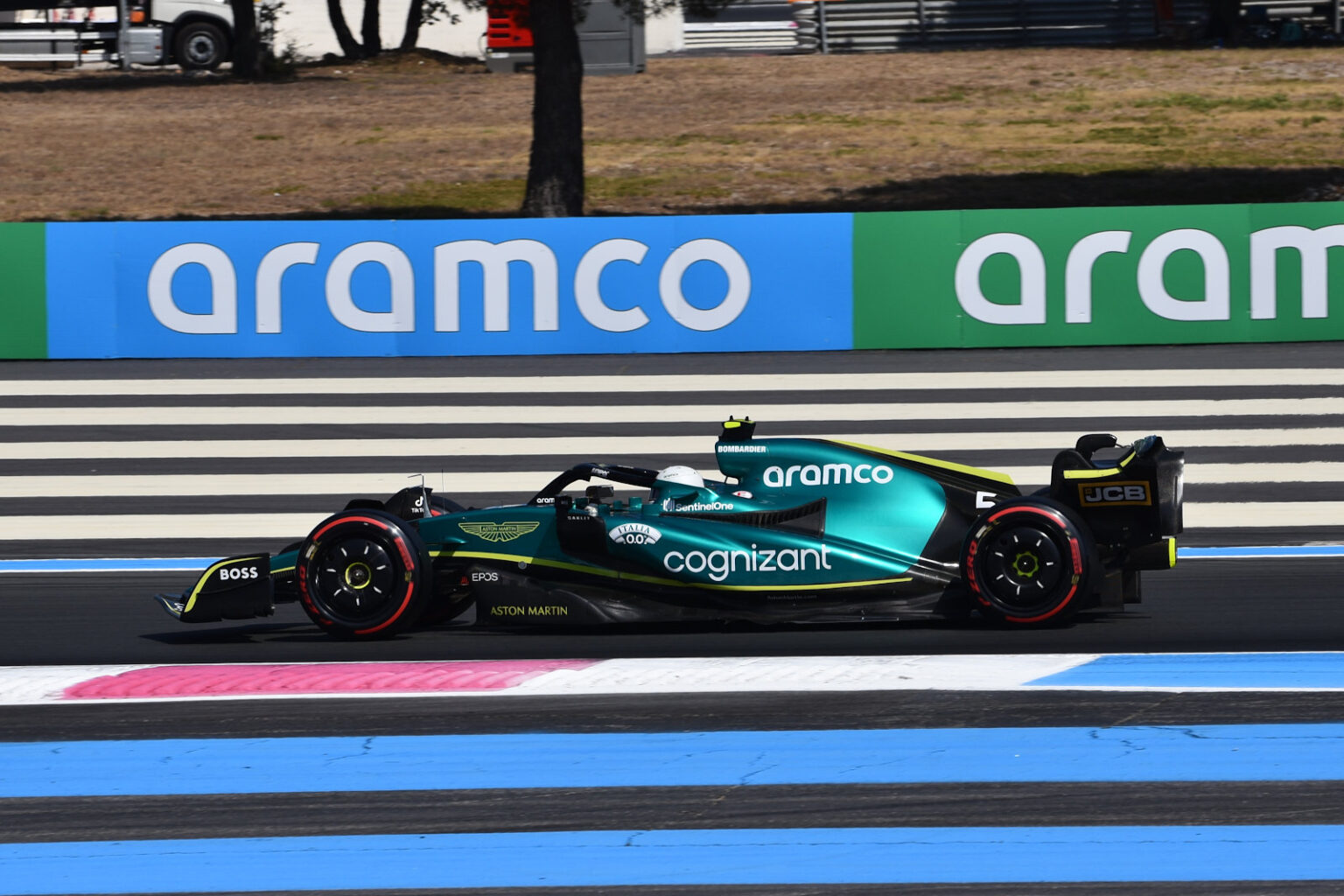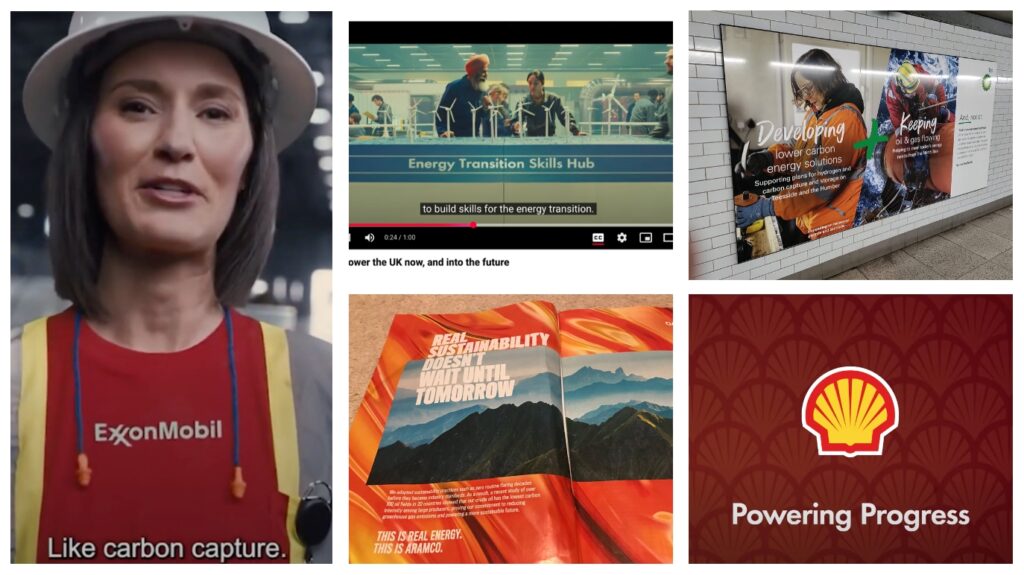Later this week, Formula One’s wildly popular documentary series, Drive to Survive, will return with a sixth season. The dramatic show, which captures the highs and lows of motorsports’ biggest stage, boasts almost seven million viewers.
The show has been pivotal for driving a whole new generation of fans to F1, a sport that now has an estimated 1.56 billion adoring devotees worldwide.
But a huge sponsorship deal with a giant oil producer is making claims that lead those fans down a dead end on climate action, putting greenwash into overdrive.
Saudi Aramco, the national oil company of Saudi Arabia, is one of F1’s most visible sponsors. The sport’s global popularity offers Aramco an unparalleled opportunity to promote a range of supposedly “green” technologies to a captive audience. Technologies such as so-called “mobile carbon capture”, in which vehicle emissions are captured and stored onboard, and ‘”advanced fuels” — synthetically-manufactured fuels that Aramco believes will help decarbonise not only F1, but road transport more broadly.
The advertising campaign promoting these technologies, which has appeared across social media as well as in print through a paid advertising partnership with the Financial Times, is the basis for a series of complaints we have submitted to UK and Dutch advertising regulators. In the complaints, we say that these adverts badly mislead motorsports fans and the wider public over the role so-called “advanced” fuels will play in decarbonising road transport, and omit key information about Aramco’s vast ongoing fossil fuel production.
Basically, these technologies are not serious solutions to the mounting decarbonisation challenge. Worse still, Saudi Aramco is not serious about actually scaling up and introducing these solutions.
Saudi Aramco’s demonstration plant will, if all goes to plan, produce approximately 35 barrels per day of “advanced fuels” — just 0.0004 percent of its existing nine million barrels a day of crude oil production.
The fossil fuel giant is happy to co-opt F1’s association with speed, progress, and innovation to mislead, confuse, and greenwash. But for Aramco, it’s less “drive to survive” and more “misguide to survive”.
Despite recently announcing a halt to its expansion plans, which the Saudi energy minister said was due to the energy transition, Aramco is still deeply dependent on oil. The company produces roughly 10 percent of the oil that the world consumes every single day.
Given the eye-watering profits such demand creates for Aramco and its owners, the company is keen to protect its market share within an energy system that is beginning to tilt towards decarbonisation. In fact, a recent exposé by The Guardian showed that a little known initiative spearheaded by Aramco and other Saudi entities, called the “Oil Demand Sustainability Programme”, is planning to lock developing nations into fossil-fuelled energy and transport systems.
This is the context in which these purported solutions fit: They are “drop-in” technologies that will not require electrification or industrial conversion, reducing the necessity for new investment as well as protecting existing assets.
Put simply: According to Aramco, internal-combustion-engine cars can continue to be bought, sold, and run on liquid fuels because it will be possible to capture the carbon emissions at the tailpipe or use “advanced” fuels that supposedly remove carbon emissions in the first place.
The potential of such technologies to cut carbon pollution from transportation has been disputed by some of the most reputable scientific bodies on Earth. Take synthetic fuels: The Intergovernmental Panel on Climate Change does not believe that these fuels will play any meaningful role in decarbonising road transport because “the total energy efficiency [of synthetic fuels] is lower than that of electric vehicles”.
Further, producing these fuels requires immense amounts of energy — energy that has to be carbon-free if the fuels are to deliver actual decarbonisation. However, a study by the International Council on Clean Transportation found that 48 percent of this energy is lost in the conversion process, which would mean diverting renewable energy away from the grid and EVs just to produce e-fuels.
These fuels will not even deliver any improvements in air pollution, which blights the lives of billions worldwide. Lab tests have shown that fossil fuels and synthetic fuels produce similar levels of toxic pollutants
These fuels will not accelerate decarbonisation in transport. They will slam on the brakes.
Aramco itself has conceded that scaling up these fuels will come at a significant cost, compared to producing biofuels or conventional fossil fuels. But to mitigate this, Aramco intends to lobby “for support policies and investments to reduce costs”. The partnership with F1 forms a vital pillar in this lobbying push, with SourceMaterial uncovering last year that in closed door meetings with top EU officials, F1 lobbied for policy support for “e-fuels”, despite their dubious contribution to decarbonising transport.
In the words of Alex Keynes of Transport & Environment, these fantasy fuels are “a Trojan horse for continued fossil fuel use”.
The tie-up between Saudi Aramco and F1 goes way beyond the soft power usually associated with sport — and that’s why we have submitted complaints to the UK and Dutch advertising regulators. Aramco has co-opted the imagery and language of F1, its legacies of innovation and speed, to push false climate solutions and mislead millions of people around the world about why societies must leave the internal-combustion-engine car behind, and how it should be done.
At the same time, F1 has used its privileged access, gained by being an accelerator and disseminator of emerging transport technology, to influence governments and policy makers, ultimately shaping the path society takes to decarbonise transport.
The complaints submitted to the UK and Dutch advertising regulators are a stepping stone to a broader, and more robust, confrontation with those who want to maintain the status quo. Sport is increasingly becoming the final frontier for fossil fuel advertising and sponsorship, with these companies able to greenwash, mislead, and misinform billions of sports fans without fear of repercussions.
This cannot be allowed to go on. Preventing the worst impacts of climate breakdown means putting our collective pedal to the metal, creating a slipstream for the technologies, policies and businesses that will build a sustainable future — a future where sport can continue to be enjoyed. Stopping the likes of Saudi Aramco from promoting false solutions in the hope of insulating their future profits is the first step to bringing that future into existence.
Freddie Daley is a research associate at the Centre for Global Political Economy, University of Sussex, exploring sustainable behaviour change, supply-side mitigation policies, and energy transitions.
Andrew Simms is an author, political economist, campaigner, and co-director of the New Weather Institute.
Subscribe to our newsletter
Stay up to date with DeSmog news and alerts






